Follow Your Different
Year End Message From Christopher
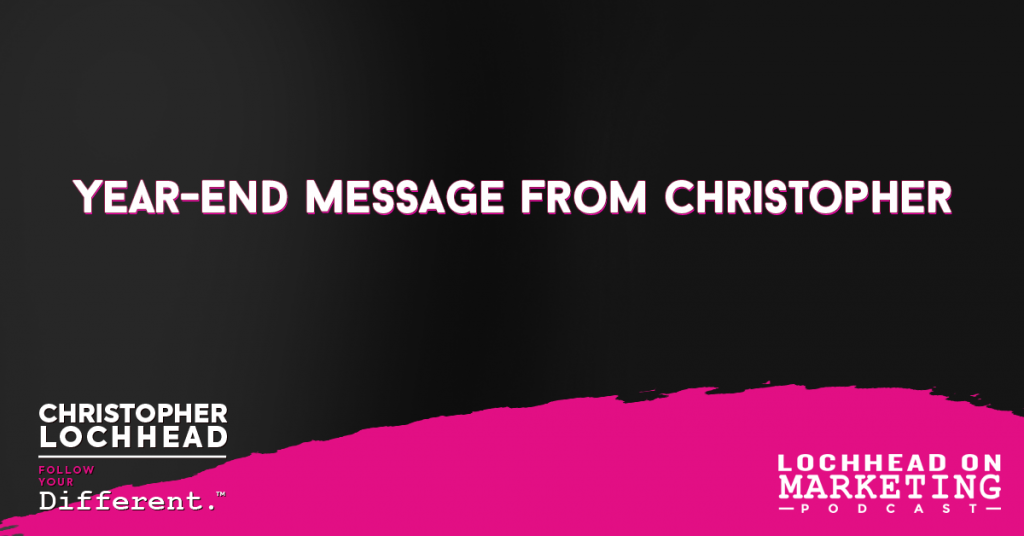
Podcast: Play in new window | Download (Duration: 2:28 — 1.7MB) | Embed
Subscribe: Apple Podcasts | Spotify | Pandora | RSS | More
Podcast (lochheadonmarketing): Play in new window | Download (Duration: 2:28 — 1.7MB) | Embed
Subscribe: Apple Podcasts | Spotify | RSS | More
This is Christopher and I just wanted to take a little moment to share a couple quick things with you.
First, just big thank you. Thank you for making me and our entire team part of your 2020.
The second thing, I know it’s been a horrible year for many of us, for me and my family, it’s been the most horrible year of all.
I also want you to know that I thought about quitting a lot this year, both podcasting and writing. Knowing that you were there, if you sent email or tweets or LinkedIn messages or just knowing you were there, has made a big difference.
I didn’t know (when I started writing and podcasting) how much the friendships that I would develop with our listeners and readers would mean to me. Even if we’ve never met or exchanged a message, I just want you to know how much I appreciate you.
Thank you because for the last 15 months, it’s really been the worst time of my life. Having you with me has made a giant difference. I know you being there has made a giant difference to our entire team. So thank you so much.
I also wanted to share a little piece that I put on social media, for those of you who might have lost someone. So I’ll just read that to you quickly.
If you have an empty chair, this holiday, I’m truly sorry. If you have an empty chair, this holiday, please know that your family does not cry alone. And if you do not have an empty chair this holiday, please remember to tell your friends and family how much you love them.
In times like these, it really calls for inspiration and who better to turn to than Winston Churchill. So I thought I’d share this quote with you.
If you will, as a toast to 2021, without courage, all other virtues lose their meaning.
So I’m going to grab hold of this Macallan 12. I have a little squirt and say, thank you. Bless you. Here’s to 2021.
198 The Future of Tech with #1 Tech Analyst R “Ray” Wang Chairman Constellation Research
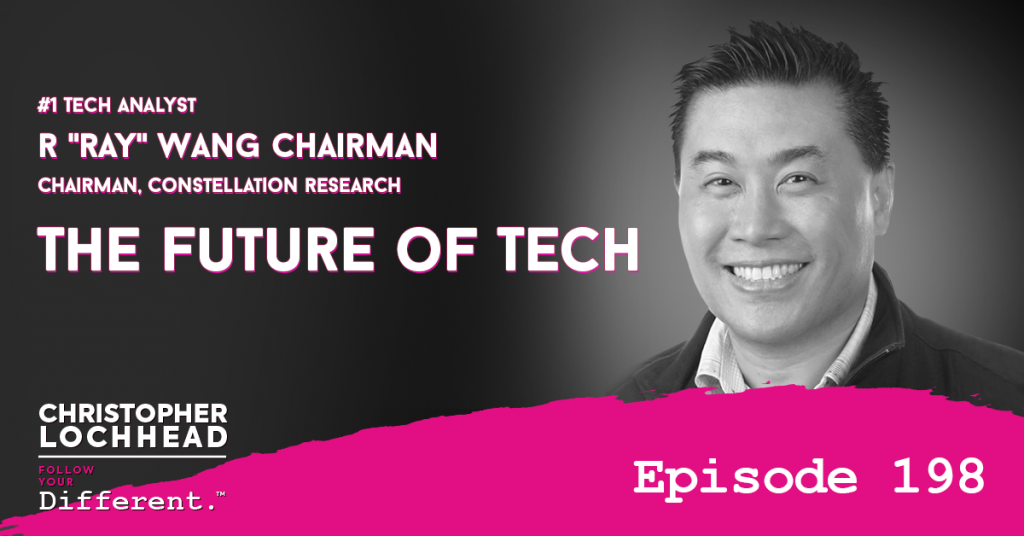
Podcast: Play in new window | Download (Duration: 52:56 — 36.3MB) | Embed
Subscribe: Apple Podcasts | Spotify | Pandora | RSS | More
What really happened in 2020? Where’s the world of technology heading? What does the future of software look like and what do we all have to be prepared for? We discuss all these and a whole lot more with Ray Wang. He’s the number one tech analyst in the world and the founder of Constellation Research. Today, give us some powerful insights as we go forward into 2021.
Salesforce Slack
Christopher and Ray dive into the discussion with COVID hypocrisy and Ray’s thoughts on the Salesforce Slack $27 billion deal, and where he sees the future of technology headed. He emphasizes the idea of business graphs and how this can potentially tap tribal knowledge for business and become a great acquisition. It is the kind of category acceleration deal that is fit for category designers, visionary entrepreneurs and CEOs who are trying to shape the future as opposed to monetizing the present or past.
“Why would we want a business graph in our business? The goal of the business graph is so that we can start making better decisions. We call them precision decisions and the goal is to improve this concept called decision velocity. Which, I talk a lot about in my book, are basically machines making decisions a hundred times per second.” – Ray Wang
Ad Revenue
Ray discusses how top companies like Google, Facebook, and Microsoft are competing head-on for digital advertising revenue. A massive winner takes all market and digital ads of category kings who are running some of the largest market shares in each of their categories. These category kings are battling for six areas of monetization: ad revenues, search revenues, goods, services, and membership subscriptions.
“There’s all your digital monetization models. Now I won’t say too much before my book comes out. That’s what we spent a lot of time talking about. These different monetization plays that are happening. We talk about how value chains are collapsing, but in Salesforce and in Microsoft’s case, they’re building this business operating system or this business nervous system. That’s actually coming in the transactions between sales orders.” – Ray Wang
Zoom in Light of Slack Salesforce Deal
Through every single video revolution the problem with video was there was never enough bandwidth. Ray shares how Zoom needs to go beyond meetings and discover the ability to integrate with everyone else. Whether this means selling at their peak and letting other people build or integrate into a future broadcast platform.
“You have your own personal ad network with the zoom. You’re basically internal only. I mean, they have the ability to do all those kinds of things. You can actually do broadcasts. You are a video property. You are basically a media property. They haven’t taken it from tool to where now the broadcast property kind of like YouTube is the broadcast pot property. So someone who’s creative enough thinking about this market that wants to go after it pretty hard could attempt to kind of work with them in that regard. Though the valuation is so high, right? That’s the challenge.” – Ray Wang
Bio:
R “Ray” Wang (pronounced WAHNG) is the Principal Analyst, Founder, and Chairman of Silicon Valley based Constellation Research, Inc.
He’s also the author of the popular business strategy and technology blog “A Software Insider’s Point of View”.
With viewership in the 10’s of millions of page views a year, his blog provides insight into how disruptive technologies and new business models such as digital transformation impact brands, enterprises, and organizations.
Wang has held executive roles in product, marketing, strategy, and consulting at companies such as Forrester Research, Oracle, PeopleSoft, Deloitte, Ernst & Young, and Johns Hopkins Hospital.
His new best selling book Disrupting Digital Business, published by Harvard Business Review Press and now globally available provides insights on why 52% of the Fortune 500 have been merged, acquired, gone bankrupt, or fallen off the list since 2000.
In fact, this impact of digital disruption is real. However, it’s not the technologies that drive this change. It’s a shift in how new business models are created.
Wang has held executive roles in product, marketing, strategy, and consulting at companies such as Forrester Research, Oracle, PeopleSoft, Deloitte, Ernst & Young, Personify, and Johns Hopkins Hospital. He is a prominent and dynamic keynote speaker and research analyst working with clients on digital, innovation, business model design, engagement strategies, customer experience, matrix commerce, and big data.
His Silicon Valley research firm, Constellation Research, Inc., advises Global 2000 companies on the future, business strategy, and disruptive technology adoption.
Ray is a regular contributor to Harvard Business Review and well quoted in The Wall Street Journal, Forbes, Bloomberg, CNBC TV, Reuters, IDG News Service, and other global media outlets. Wang has thrice won the prestigious Institute of Industry Analyst Relations (IIAR) Analyst of the Year Award.
Links:
Constellation Research: Ray Wang
Personal Log: Understanding Case Fatality Rates For #COVID19 #CoronaVirus
We hope you enjoyed this episode of Follow Your Different™! Christopher loves hearing from his listeners. Feel free to email him, connect on Facebook, Twitter, Instagram, and subscribe on iTunes!
197 Embrace The Suck w/ Navy SEAL Brent Gleeson
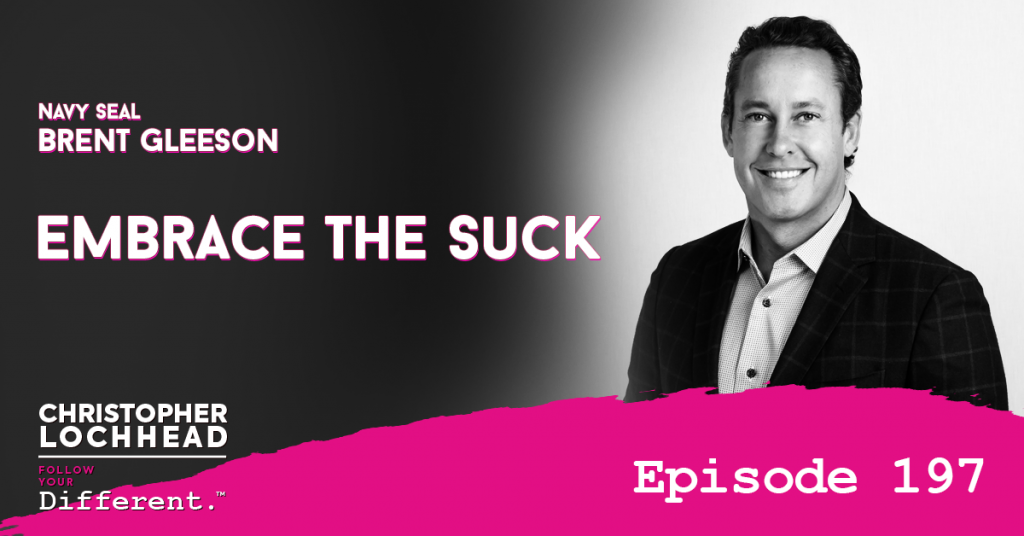
Podcast: Play in new window | Download (Duration: 1:05:36 — 45.0MB) | Embed
Subscribe: Apple Podcasts | Spotify | Pandora | RSS | More
In today’s episode, we have legendary combat veteran Navy seal Brent Gleason. He’s got a red, hot, rocking, new book out called Embrace The Suck. Brent is a successful entrepreneur, author and speaker and his new book is catching everybody’s attention. Today, we get into why Brent thinks we need to lean into pain, how to deal with failure and rise up to any challenge, no matter what.
Leading Through Change
Brent gives us an inside look on what it was like as a legendary combat veteran Navy seal. Moreover, he shares his perspective on the pandemic and what he thinks leaders should be doing. He thinks organizations should reevaluate the needs of its people based on a lot of factors.
“The global pandemic has caused an even heightened level of leadership, complexity, and challenge. As leaders, we’re supposed to show empathy and be innately in tune with what motivates each individual on our team, within our direct reports and our peers. Now with everybody working predominantly in a remote setting, everybody has a different environment that they’re now in. In addition, some people thrive in remote settings and others feel isolation and uncertainty. Greater levels of digital silos are now creating communication challenges. Obviously your organization is going to go through a lot of change.” – Brent Gleeson
Leaning Into The Pain
In his book, he shares psychological, emotional, and physical pain and suffering and how various people deal with pain. There is a purposeful suffering that everyone must engage in to achieve loftier goals and causes greater than ourselves. These will serve to develop individuals in expanding the boundaries of one’s comfort zone. In turn, lead to a more fulfilling, happier, and purpose-driven life.
“When have you ever achieved anything meaningful in your life that did not have something attached to it? Like some level of pain, suffering, or adversity. The answer is nothing. When have you ever done something that gave you true fulfillment that was trapped within the confines of your comfort zone? Nothing. It’s only when we peak beyond the boundaries of the comfort zone and see what’s out there. That is what expands your comfort zone and moves the goalposts. You make it a ritual part of your existence and part of your mindset.” – Brent Gleeson
Taming The Tiger
Brent discusses how in life there are choices down the road that lead you to temptation. He shares how one can tame the tiger and resist temptation. In life, humans are inevitably tempted and human centered, the goal is to mend the relationships or goals one is focusing on.
He shares how it ultimately comes down to the philosophy of simply limiting choices and creating an environment that supports your objective. He discusses how one should set themselves up for success by being purposeful in the environment and what one creates. Lessening the opportunity to be distracted or tempted by things that do not align with the actions necessary to achieve the desired outcome.
“In order to tame my tiger, I had to transform my entire lifestyle and mindsets to limit the choices. I removed every possible element of temptation from my life that would stand in the way of the goals I had made. So my social life, my dietary habits, workout regimen, even going as far as removing people from my life that I knew would stand in the way of achieving that goal. If I wanted to achieve my goal, all that stuff had to go.” – Brent Gleeson
To know more about the legendary Brent Gleeson, his new book and his incredible life journey. Download and listen to this episode.
Bio:
Brent Gleeson was a member of SEAL Team 5, some of the first SEALs deployed to Iraq in early 2003. He completed combat deployments in Iraq, Africa, and other theaters of war.
After returning to civilian life, Brent earned an MBA and has built award-winning, multi-million dollar organizations that have repeatedly landed on the Inc. 500 list of fastest growing private companies.
He is the author of TakingPoint and has starred in several reality shows including Mark Burnett’s ‘Stars Earn Stripes.’
Links:
Taking Point Leadership – Books
We hope you enjoyed this episode of Follow Your Different™! Christopher loves hearing from his listeners. Feel free to email him, connect on Facebook, Twitter, Instagram, and subscribe on iTunes!
196 The Last Wine Frontier: Bhutan W/Michael Juergens
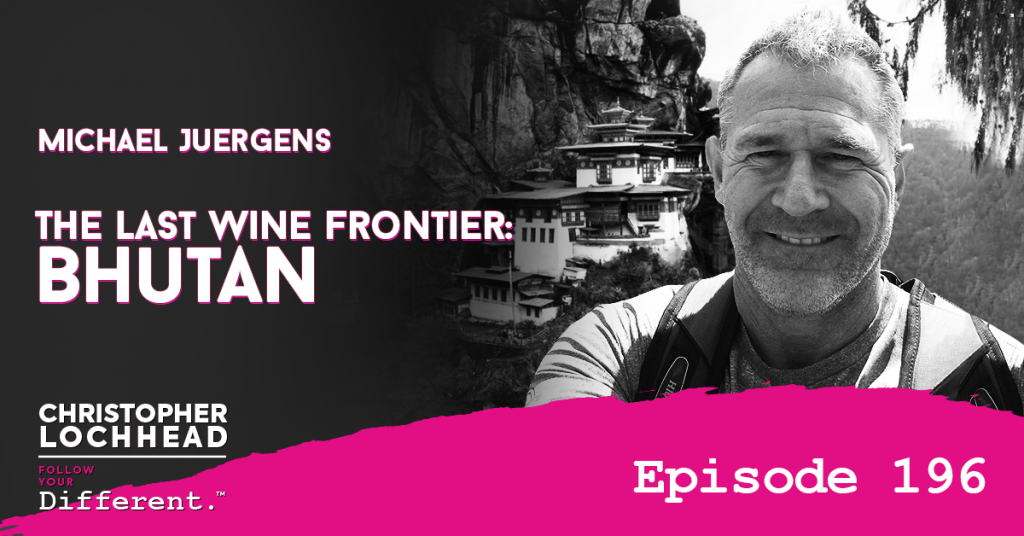
Podcast: Play in new window | Download (Duration: 1:08:34 — 47.1MB) | Embed
Subscribe: Apple Podcasts | Spotify | Pandora | RSS | More
Our guest today Michael Juergens, is a senior partner at Deloitte. He’s also a super wine geek of the highest order and on a trip to the Bhutan in 2016 , he discovered there was no vineyards there at all. What you’re about to listen to is the real story of how Michael, by accident, connected with government leaders in this magic little country to become the founder of a new industry and is pioneering the last great wine frontier.
Bio:
Michael Juergens doesn’t fit into a simple box.
As a senior partner in a large global consulting firm, he’s a seasoned business executive who spends his time advising Fortune 500 organizations.
His passion for wine has led him to be a candidate to become the 45th American to qualify as a Master of Wine and he started the wine industry in the Kingdom of Bhutan in the Himalayas.
He also owns the award winning SoCal Rum company.
He’s an internationally known speaker and author, and also is a professor at the University of CA, Irvine.
He plays the drums in a punk rock band, and spends his free time diving with great whites, building motorcycles and hot rods, and running adventure races in remote locations around the world.
Links:
The World’s Newest Wine Frontier Is the Himalayan Kingdom of Bhutan
First Vineyard Planted In Bhutan
Bhutan, Land of the Thunder Dragon
Bhutan: Committed to Conservation
We hope you enjoyed this episode of Follow Your Different™! Christopher loves hearing from his listeners. Feel free to email him, connect on Facebook, Twitter, Instagram, and subscribe on iTunes!
195 Neil Pearlberg, Santa Cruz Surf & Skateboard Podcast Legend
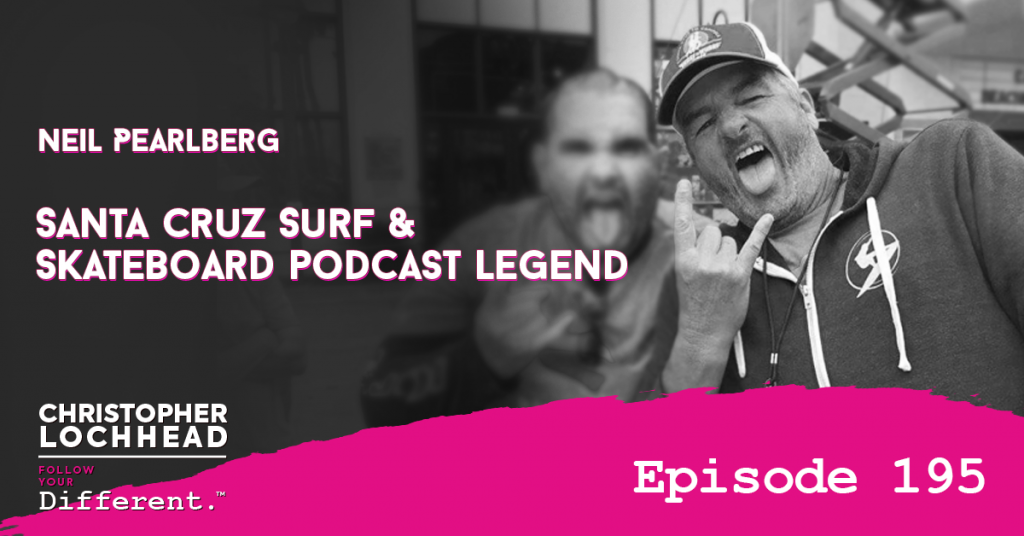
Podcast: Play in new window | Download (Duration: 1:09:26 — 47.7MB) | Embed
Subscribe: Apple Podcasts | Spotify | Pandora | RSS | More
Imagine sitting on a wonderful backdoor deck, overlooking the vast beautiful bluey green Pacific ocean as sets of waves. Roll in on a perfect warm sunny fall day in beautiful Santa Cruz, California. Then imagine a funny, ADHD infused conversation between two buddies with the beers and tequila flowing. Well, that’s what we have today, with none other than Santa Cruz, icon, surf/skate legend, host of the mega popular podcast Off The Lip, Neil Pearlberg. In this episode, we get silly. We swear a lot and have tons of fun. I invite you to crack open a cold one and join Chris and Neil for a lot of fun.Bio:
Since September 2009, Neil Pearlberg has written over 200 articles covering the sport of surfing, as well as skateboarding, and soccer, for the Bay Area News Group, & Santa Cruz Waves. He is also the host of the “Off the Lip Radio Show”, & Hour Local Radio Show aired on Santa Cruz Radio Show KSCO AM 1080, FM 104.1, ksco.com and streamed on Santa Cruz Waves Facebook Page. Neil has also published articles in Adventure Sports Journal, National Geographic, Stand Up Paddle Board Magazine.Links:
Off the Lip Radio Instagram: @offthelipradioshow Twitter: @offthelipradio Linkedin: Neil Pearlberg We hope you enjoyed this episode of Follow Your Different™! Christopher loves hearing from his listeners. Feel free to email him, connect on Facebook, Twitter, Instagram, and subscribe on iTunes!194 The Life of A Legendary Songwriter w/ Nashville Songwriters Hall of Famer Sharon Vaughn
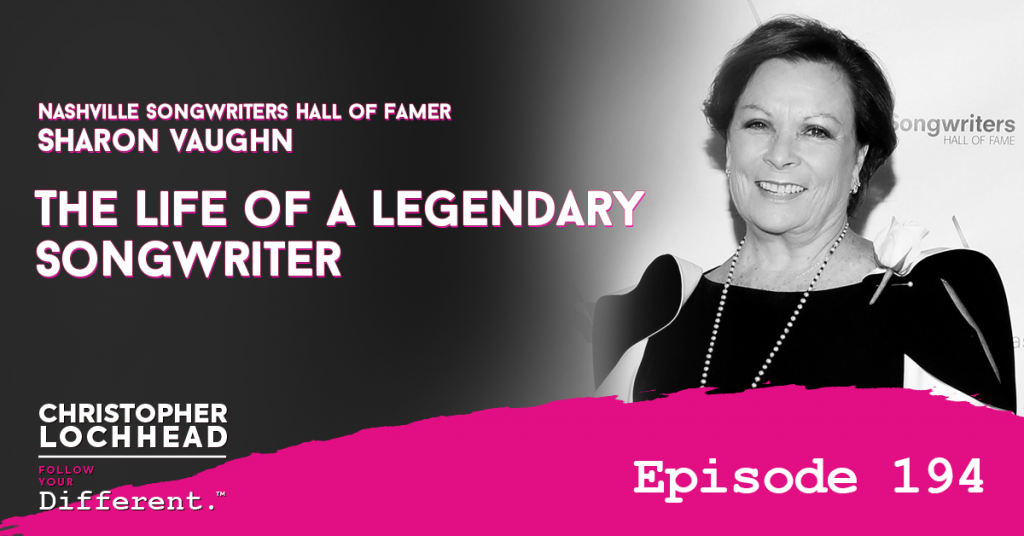
Podcast: Play in new window | Download (Duration: 1:06:45 — 45.8MB) | Embed
Subscribe: Apple Podcasts | Spotify | Pandora | RSS | More
Today, we go deep into the life, lessons and learnings of a legendary musician, singer, producer, and songwriter Sharon Vaughn. Sharon has written hits for legends like Willie Nelson, Waylon Jennings, Reba McEntire, The Oak Ridge Boys, George Jones, Kenny Rogers, Randy Travis, Patty Loveless, Agnes, and Kate Ryan. In 2019 Sharon was inducted into the Nashville Songwriter’s Hall of Fame.
If you’re a creative person, if you love music and if you find inspiration in stories of amazing triumph, you’ll love this episode. Pay special attention to Sharon’s thoughts on the grand dame of country music, Dolly Parton.
A Creative Writing Instrument
Sharon discusses her professional and personal background and how she developed an interest in singing and songwriting. She goes into detail about how her writing process has been a schizophrenia lifestyle.
“It’s a very difficult line to walk because if you’re writing for strictly commercial, it gets vapid. If you’re writing strictly for an emotional purging, then it gets selfish and self centered. But if you walk that straight and narrow line between commercial and genuine emotion. That’s where the tension lies.” – Sharon Vaughn
Admiration of Musical Genius
Sharon continues to discuss her professional journey. She lets us in on her joys and difficulties of what it was like to work as a harmony singer. Further, she shares what it was like working with Jimmy Buffet, Porter Wagoner, Bill Anderson, and Dolly Parton.
Nashville Songwriters Hall of Fame
Sharon describes her excitement and her thankfulness for being inducted to Nashville Songwriters Hall of Fame. Further, she expresses her gratefulness to the people along the way who have been instrumental to her life. This all had contributed to her becoming a great listener and a legendary storyteller.
“Everybody on this planet has a story. Most of them are very eager for you to hear it, to tell it. All you have to do is have enough curiosity to listen and respect what they’re saying. You have to realize that everybody in this world is worthy of listening to. I, for one, have been the recipient of listening to people and that’s the main thing I’m most grateful for. ” – Sharon Vaughn
To know more about the legendary Sharon Vaugh and her incredible life journey, download and listen to this episode.
Bio:
Vaughn moved to Nashville in her early 20s. In 1974, she charted two singles as a performer for Cinnamon Records: a duet with Narvel Felts titled “Until the End of Time”, and “Never a Night Goes By”. A year later, she signed with Dot Records and released a third single, “You and Me, Me and You”. She was also the lead singer in the Lea Jane Singers, and worked with the Jordanaires, the Nashville Edition and The Holladay Sisters.
Vaughn’s first big songwriting success was Waylon Jennings (1976) “My Heroes Have Always Been Cowboys.” Willie Nelson later popularized the song in 1980 for the soundtrack of the movie The Electric Horseman.
Her next songwriting hit was The Oak Ridge Boys (1977)’s “Y’all Come Back Saloon.” Since then she has worked with country artists such as Dolly Parton, Waylon Jennings, George Jones, Tammy Wynette, Tanya Tucker and Kenny Rogers. Vaughn was a nominee for the Nashville Songwriters Hall of Fame three times, and was inducted in 2019.
Vaughn has during the last couple of years had over 100 cuts with European artists and four number ones in Japan. She has worked with several Swedish Idol artists including the winner Jay Smith (2010) and a number one hit for Ola. She has also worked with many Scandinavian songwriters and artists including Agnes, Mutt Lange, Tony Nilsson, Vendela, Anders Hanson and Emilia.
In 2009, her co-written song Release Me by Swedish pop artist Agnes reached #1 on the U.S Billboard Dance Club Songs Chart.[8] In 2013, Vaughn received a JASRAC Award as #1 of the Top 10 Foreign Works for her 2011 co-written song “Rising Sun” by the Japanese pop band EXILE.
During 2014, Vaughn competed as the songwriter of three songs in Melodifestivalen.
Vaughn has also co-written songs with Ian Dench[11] and Carl Falk.
Links:
Nashville Songwriters Foundation Hall of Fame
My Heroes Have Always Been Cowboys – Waylon Jennings
My Heroes Have Always Been Cowboys – Willie Nelson
Wikipedia – My Heroes Have Always Been Cowboys
We hope you enjoyed this episode of Follow Your Different™! Christopher loves hearing from his listeners. Feel free to email him, connect on Facebook, Twitter, Instagram, and subscribe on iTunes!
193 Ryan Holiday NY #1 Best Seller On “Lives Of The Stoics”
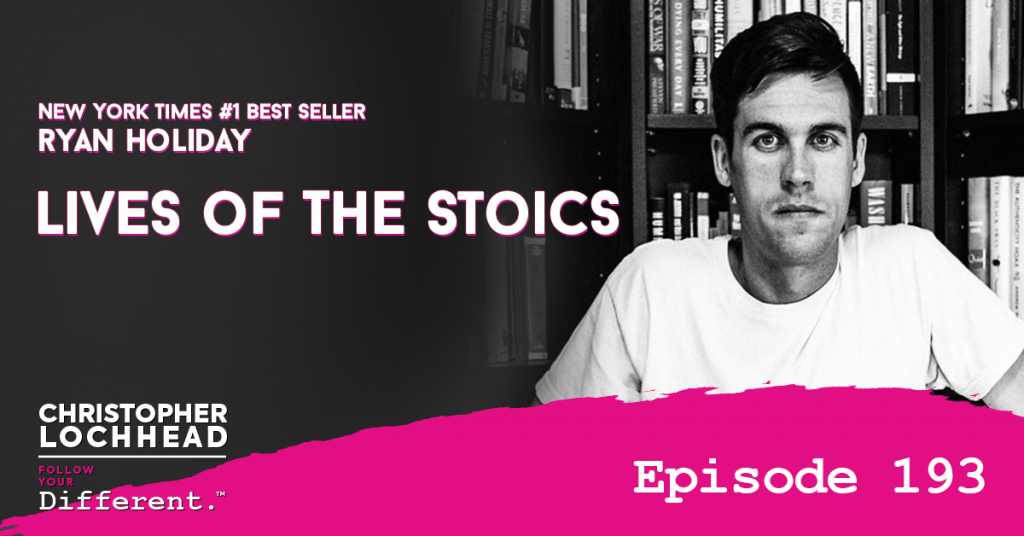
Podcast: Play in new window | Download (Duration: 1:17:52 — 53.5MB) | Embed
Subscribe: Apple Podcasts | Spotify | Pandora | RSS | More
We continue our run on legendary authors today with none other than NY #1 Best Selling Author, Ryan Holiday. You see, the only authors we ever have are the ones that we think have ideas, teachings, and stories that are worth digging into.
Today, we go deep into the teachings of some of the greatest thinkers in history. Ryan helps us see the events of today through the lens of powerful philosophers and history, providing today, in an incredible context. We deal with big topics like truth, character, pain, and suffering humor, and a lot more.
Invest Time in Reading
Chris lauded Ryan for writing a historical book in the age where almost everyone is addicted to selfies. Ryan was actually amazed himself how in this age and time, people still invest in time and money reading books. He shares what he thinks about good books and why people still opt for a book, instead of getting validation in social media.
“I opened the book, there’s a story about Xenos, the founder of Stoicism. You get this prophecy as a young man that the Oracle tells him ‘you will become wise when you begin to have conversations with the dead.’ Years later at a chance encounter in a bookstore, do you come to realize that this prophecy was about reading, that books are a way to speak to the dead.” – Ryan Holiday
Condensed Life Experiences
Ryan and Chris discuss life-changing books. Ryan shares an anecdote from Socrates saying: “the reason you read is that you gain quite easily what others learned quite painfully.” He further describes his new book Lives Of The Stoics, as something less about him and more about the wisdom of the past.
“Reading is condensed information. It’s distilled down information. In reading one book, you could jump forward a year of your life, or 10 years of your life. It can save you painful trial and error.” – Ryan Holiday
An Escape and Reassurance
Ryan further shares what he thinks about good books being an escape and reassurance. Reading books, especially historical ones, will make you realize that you are not alone dealing with your feelings or that there are universal truths that span from generations. One of which is human struggling and the fight between good and evil.
“I find whenever I’m stressed about what’s happening, I try to study the past. This gives me a clear view of what’s happening right now.” – Ryan Holiday
To know more about Ryan Holiday and his new NY best-selling book, Lives of the Stoics, download and listen to this episode.
Bio:
Ryan Holiday is one of the world’s foremost thinkers and writers on ancient philosophy and its place in everyday life.
He is a sought-after speaker, strategist, and the author of many bestselling books including The Obstacle Is the Way; Ego Is the Enemy; and The Daily Stoic.
He’s newest book Lives Of The Stoics is an instant New York Times Advice & Business Bestseller, USA Today Bestseller, and Wall Street Journal #1 Bestseller.
His books have been translated into over 30 languages and read by over two million people worldwide. He lives outside Austin, Texas, with his family.
Links:
Amazon – Lives of the Stoics: The Art of Living from Zeno to Marcus Aurelius
We hope you enjoyed this episode of Follow Your Different™! Christopher loves hearing from his listeners. Feel free to email him, connect on Facebook, Twitter, Instagram, and subscribe on iTunes!
192 How Heroes Fight Wildfires w/ CAL FIRE Chief Jonathan Cox & ZoneHaven CEO Charlie Crocker
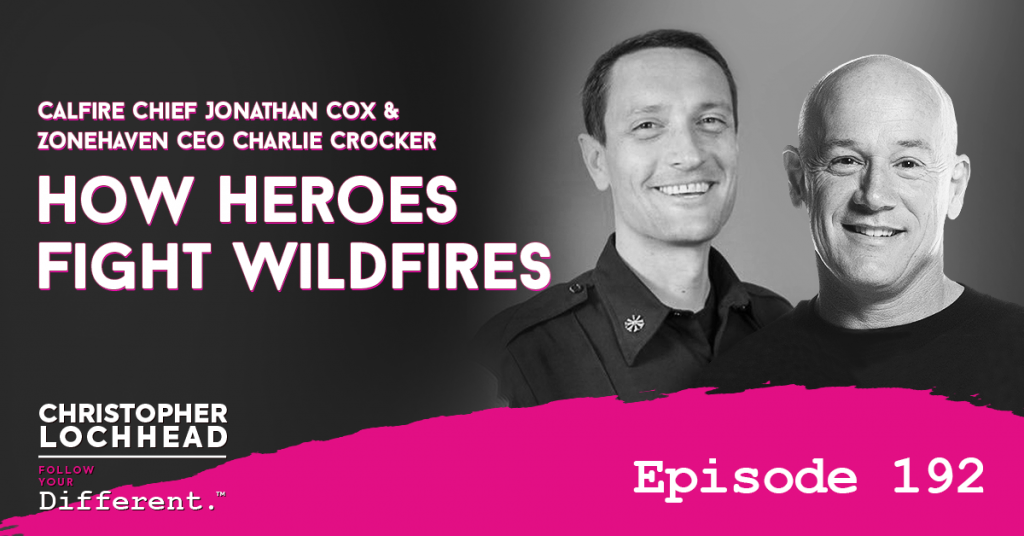
Podcast: Play in new window | Download (Duration: 1:20:51 — 55.5MB) | Embed
Subscribe: Apple Podcasts | Spotify | Pandora | RSS | More
In this episode, a truly legendary conversation with two extraordinary men, men who are on a mission to stop deadly wildfires. First, we have Charlie Croker, the founder and CEO of Zone Haven. Zone Haven is using data to everything technologies, to help government agencies and citizens both plan for and respond to serious disasters.
Our second guest is Chief Jonathan Cox, CalFire Executive who is responsible for fire operations in this region.
Together, Charlie and Jonathan share how firefighting heroes stop these fires and save countless lives and billions in property.
A Night Californians Will Never Forget
The night of Saturday, August 15 2020, a massive lightning storm hit the region. Approximately 12,000 strikes of lightning hit Northern California which caused massive fires. The wildfire lasted for weeks and it destroyed almost 10,000 buildings along with the big basin redwoods State Park, and took the life of one person.
“It was a horrifying fire and it started eating the mountainous area that has a lot of underbrush, some of the most beautiful ancient redwoods, and a lot of wonderful homes, towns and businesses.” – Christopher Lochhead
The Worst Fire Season In History
Chief Jonathan Cox recounted to Chris how they had expected the worst for the wildfire season. However, they did not expect this horrible incident to have grown into that magnitude. He further explained their process and prioritization and how technology from Zone Haven has contributed a lot to their firefighting efforts.
“We’re very good when there’s one or two large fires burning, getting an incident management team assembled and getting resources drawn throughout the system. But this really was one of those moments where you had concurrent major emergencies happening in a small geographical area, really in the Bay Area, and a little bit north, and it really turned into a prioritization of resources based on the threat to humans and the threat to structures.” – Chief Jonathan Cox
Saving Lives and Properties
Charlie Crocker, from Zone Haven shares the technology as it relates to helping CalFire make sound decisions during that emergency. He further shares in this episode how their communication strategy, along with the CalFire executives, were in sync and were out of the box, that it made drastic results in terms of preventing more damages.
“The main focus of it and why we’re called Zone Haven is that we really focus on very small neighborhoods or zones. So these zones are smart. They know the number of people, they know how quick, how long it’s going to take for people to get out of there.” – Charlie Crocker
To know more about How Heroes Fight Wildfires and for more information about CAL FIRE Chief Jonathan Cox & ZoneHaven CEO Charlie Crocker, download and listen to this episode.
Bio:
CAL FIRE Deputy Chief Jonathan Cox
CalFire Deputy Fire Chief Jonathan Cox oversees fire operations at the San Mateo County Division of CAL FIRE, which includes San Mateo County Fire Department and Coastside Fire Protection District.
His passion for the fire service started young, prior to his current role he worked both municipal and wildland fire field operations with CAL FIRE at Coastside Fire District, San Mateo County Fire Department and San Luis Obispo County Fire Department.
In addition, he spent several years as the Northern California spokesperson for CAL FIRE. Jonathan was also a founding member for CAL FIRE’s land use planning program at the Office of the State Fire Marshal (OSFM), working with local jurisdictions to make informed land use decisions related to the threat of wildfire.
Jonathan also responds to, and manages, some of California’s largest disasters. He spent five years as a member of CAL FIRE’s Incident Management Team 6 (FEMA Type 1), where he served on the command staff in the capacity of Public Information Officer (PIO1).
He holds a Bachelors Degree from Cal Poly, San Luis Obispo and a Masters Degree from the University of Copenhagen, Denmark.
He has also completed an intensive training at the United Nations Institute for Training and Research (UNITAR) in Geneva, Switzerland.
Jonathan is a State of California (OSFM) certified Chief Officer and Registered Instructor.
Additionally, Jonathan is an emergency response educator and trainer in the field of emergency management and crisis communications.
He has been a subject matter expert speaker at numerous conferences, including the National Fire Protection Association. His work has spanned five countries and involved working with hundreds of professionals.
He has lived in the US, Denmark and the United Kingdom.
Charlie Crocker, Founder/CEO Zonehaven
Charlie is the Co-Founder and CEO of Zonehaven Inc.
He is a data geek and entrepreneur with more than 25 years of experience building teams to bring data out of the shadows and drive business value.
Prior to Zonehaven, he built Autodesk’s first big data platform team to support migration to subscription and the cloud. He also led product management for Autodesk’s flagship AutoCAD product line.
Prior to Autodesk he was co-founder in a start-up focused on spatial databases and web-based tools for state and local government agencies and utility companies.
Charlie has a passion for growing young leaders.
He mentors MBA and MSBA students at UC Davis and California College of the Arts.
Links:
DONATIONS: CZU Lightning Complex fire: Give help, get help
Linkedin: Chief Cox
Twitter: @firechiefcox
Website: ZoneHaven.com
Linkedin: Charlie Crocker
We hope you enjoyed this episode of Follow Your Different™! Christopher loves hearing from his listeners. Feel free to email him, connect on Facebook, Twitter, Instagram, and subscribe on iTunes!
Time-out for Democracy
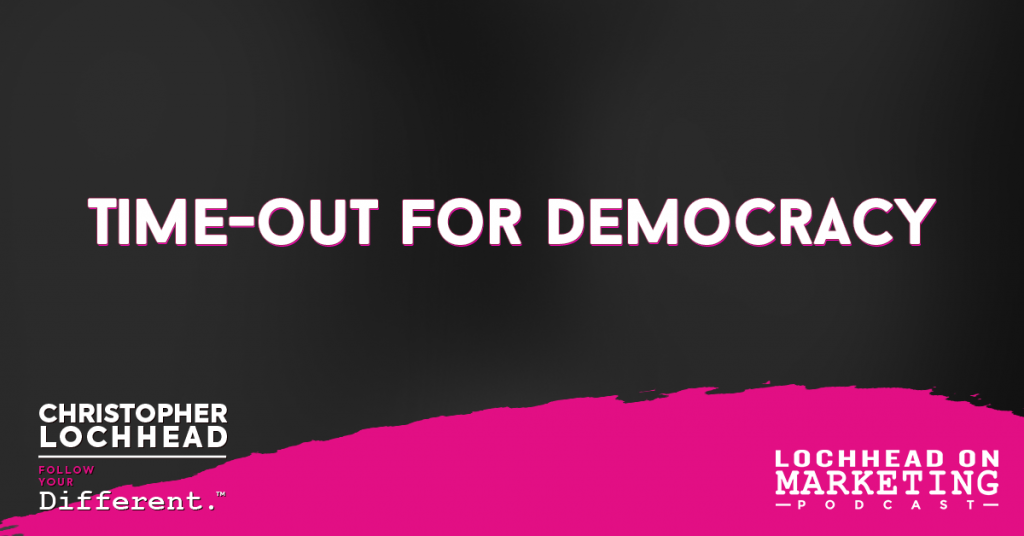
Podcast: Play in new window | Download (Duration: 4:39 — 3.2MB) | Embed
Subscribe: Apple Podcasts | Spotify | Pandora | RSS | More
This is Christopher. I wanted to let you know that we are going to take the pause that refreshes here as America votes. The entire attention of the United States is on the election as it should be. Much of the attention of Americans and the entire world is focused on this election.
We thought the wise thing to do would be to take some time off and come back after the election. The good news is if you love either of our podcasts, we have a tremendous back catalog. Unless you’ve listened to every Follow Your Different™ and every Lochhead on Marketing™ episode, there’s probably some gems in there you could really benefit from.
If you want a break from all of the political news over the next handful of days, there are some amazing conversations, legendary even that you might enjoy.
I want to ask you to vote
If you’re an American, I believe voting is a civic duty. I think it’s important to remember that. Democracy can’t happen without participation from its citizens. I think it’s important to remember that people have died for the right to vote. I think it’s important to remember that there are many human beings on planet earth who do not get that right, who do not live in a democracy where their voice matters.
I’m no political expert, but if you look at the polls and consume information, news and data, it looks like there’s a very good chance this could be a very close election.
I think the worst outcome we could have would be a rerun of 2000 Bush versus Gore or anything along those lines. I think what we absolutely need in the United States of America is a clear winner at the presidential level and a clear direction for Congress.
We need leaders, federally, who have a clear mandate to govern. I think a big part of the problem that we’ve had is things have been so close lately that many of us our confused by the messages.
We have a very divided country.
So please vote, make a plan to vote.
***
We’ll be back with new episodes of both Lochhead on Marketing™ and Follow Your Different™ shortly after the election here in the United States, bless you.
Please take care, stay legendary. And until we’re together again, follow your different.

